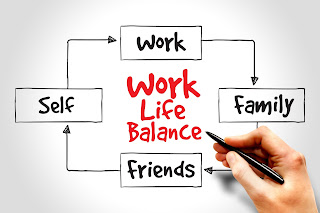Making Work-Life Balance Work
Trying to find a work-life balance in
today's fast-paced world is tough. If you spend more time in the office than at
home you’re likely to lose a satisfying personal life. On the other hand, if
you have trials in your personal life, such as looking after an aging parent or
managing marital or financial issues, focusing on your job can be tough. Whether the issue is too much focus on work or too little, when your
work life and your personal life seem out of sync, stress and its harmful
effects result. To be in control, first thing is to examine how the world of
work has changed, then reexamine your relationship to work and use these strategies
to hit a healthier balance.
How work encroaches into your
personal life
There was a time when employees
showed up for work Monday through Friday and worked eight to nine hours. The
boundaries between work and home were fairly clear then. But the world has
changed and, unfortunately, the boundaries have blurred for many workers. Here are
five reasons why:
1. The global economy means
hiring more skilled workers or outsourcing more jobs putting pressure on people
to work longer in order to protect their jobs.
2. It is a continuous 24/7 work
routine for several people, especially if you work for an international
organisation, you’re likely to be on standby round the clock for consulting or
troubleshooting tasks
3. The ability to work anywhere
is a consequence of modern communication technology. Even vacation is no
exception.
4. Working longer hours is expected by some
employers, particularly if you desire a quick promotion up the career ladder.
Working more than 40 hours is usually part of the equation.
5. Many families are the typical
dual-career couple, making it hard to set aside time for commitments to family,
friends, and public obligations.
Hitting the best work-life
balance strategies
It is tough managing the demands
of career and personal life. It is a persistent fight to cut down stress and
sustain peace and accord in key areas of some people’s lives. Find below some
tips on how to discover the balance appropriate for you:
Decide
priority activities. Decide what is necessary and
satisfies you the most in your work and non-work activities. Remove or pass on activities
you don’t enjoy, don’t have time for or doing out of guilt. Discuss with your
superior about certain decisions you don’t have the right to make.
Look at
the likelihood of work options. Find
out if your employer offers flex hours, a compressed workweek, job-sharing or
telecommuting for your role. The flexibility may alleviate some of your stress
and free up some time.
Manage
your time. Organise household tasks
efficiently. Doing one or two loads of laundry every day rather than saving it
all for your day off (better still get a laundry man to take the stress off
you), and running errands in batches rather than going back and forth several
times are good places to begin. A weekly family calendar of important dates and
a daily list of to-dos will help you avoid deadline panic. If your employer
offers you a course in time management, jump at it.
Don’t be
obsessed about cleanliness. Ignoring an untidy bed or dirty
kitchen sink once in a while will not shatter your world. Do what you can do
and leave the rest. Hire a housekeeper
if you can afford it to take the headache off.
Don’t
feel guilty. Try to remember that working
and taking care of family at the same time is a modern thing and very okay for
both men and women.
Pamper
yourself. Clear your head and unwind
after a stressful workday by reading, listening to music, working out, walking,
doing yoga, or taking a soothing bath or shower.
Create
time for leisure. Put off your phone, the
computer and the TV. Experience activities you and your partner both enjoy, or
with family or friends such as playing golf, or just outdoor picnic. Creating
time for enjoyable leisure will revitalise you.
Get enough
sleep. Nothing affects your
productivity more than sleep deprivation. Poor sleep is stressful and possibly
dangerous as you’re then prone to making costly mistakes at work, which then
cost you more hours to make up for those mistakes.
Appreciate
your friends. Improve your inter-personal
relationship by opening up to a trusted friend or co-worker during period of
stress or hardship. If you belong to a religious community, take advantage of
the support your religious leader can provide.
Look for professional assistance. Everyone needs help
from time to time. If your life feels too chaotic to manage and you are going
off the wall worrying about it, talk with a professional such as your doctor, a
psychologist or a counselor.
Photo credit: Creative Commons.






Wonderful post, I loved the read. By the way, did you know that ax dynamics is believed to be the best erp software for almost every business? Wow!
ReplyDelete